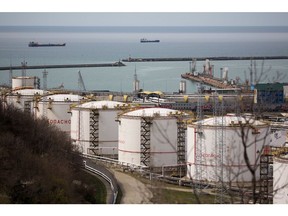
Article content
(Bloomberg) — The UK joined the European Union’s efforts to diminish Russia’s revenues further by lowering the price cap on its crude oil, extending a broader push to pressure the Kremlin for continuing the war in Ukraine.
THIS CONTENT IS RESERVED FOR SUBSCRIBERS ONLY
Subscribe now to read the latest news in your city and across Canada.
- Exclusive articles from Barbara Shecter, Joe O'Connor, Gabriel Friedman, and others.
- Daily content from Financial Times, the world's leading global business publication.
- Unlimited online access to read articles from Financial Post, National Post and 15 news sites across Canada with one account.
- National Post ePaper, an electronic replica of the print edition to view on any device, share and comment on.
- Daily puzzles, including the New York Times Crossword.
SUBSCRIBE TO UNLOCK MORE ARTICLES
Subscribe now to read the latest news in your city and across Canada.
- Exclusive articles from Barbara Shecter, Joe O'Connor, Gabriel Friedman and others.
- Daily content from Financial Times, the world's leading global business publication.
- Unlimited online access to read articles from Financial Post, National Post and 15 news sites across Canada with one account.
- National Post ePaper, an electronic replica of the print edition to view on any device, share and comment on.
- Daily puzzles, including the New York Times Crossword.
REGISTER / SIGN IN TO UNLOCK MORE ARTICLES
Create an account or sign in to continue with your reading experience.
- Access articles from across Canada with one account.
- Share your thoughts and join the conversation in the comments.
- Enjoy additional articles per month.
- Get email updates from your favourite authors.
THIS ARTICLE IS FREE TO READ REGISTER TO UNLOCK.
Create an account or sign in to continue with your reading experience.
- Access articles from across Canada with one account
- Share your thoughts and join the conversation in the comments
- Enjoy additional articles per month
- Get email updates from your favourite authors
Sign In or Create an Account
or
Article content
The cap on Russian oil, currently set at $60 per barrel, will be lowered to $47.60 on September 2, the UK government announced Friday. The price caps of $100 on high-value refined oil products, such as diesel and petrol, and $45 on low-value refined oil products, such as fuel oil, remain unaffected.
Article content
Article content
Article content
EU states earlier approved a fresh sanctions package on Russia that included new banking restrictions and curbs on fuels made from the nation’s petroleum. The package — the bloc’s 18th since Moscow’s full-scale invasion of Ukraine — will also cut off 20 more Russian banks from the international payments system SWIFT and impose restrictions on Russian petroleum refined in other countries. A large oil refinery in India, part-owned by Russia’s state-run oil company, Rosneft PJSC, was also blacklisted.
Article content
By signing up you consent to receive the above newsletter from Postmedia Network Inc.
Article content
The latest sanctions from the UK and EU are aimed at further crimping the Russia’s energy revenue, the bulk of which comes from oil exports to India and China. It comes after the original price cap imposed by the Group of Seven had a limited impact due to a large shadow fleet of tankers that haul its oil without using western services.
Article content
The revised cap approved by the EU will be set at 15% below market rates moving forward and revised automatically at least twice a year.
Article content
“This decisive step to lower the crude Oil Price Cap will target Russia’s oil revenues and ramp up the pressure on Putin by exploiting his biggest vulnerability – while keeping energy markets stable,” said UK Chancellor of the Exchequer Rachel Reeves.
Article content
Article content
The UK and EU have so far failed to convince the US to support the lower cap. Discussions are ongoing with other G-7 members but the US opposition is making it hard to reach agreement, according to people familiar with the matter.
Article content
The EU’s move to restrict fuels such as diesel made from Russian crude could have some market impact because Europe imports the fuel from India, which in turn buys large amounts of Russian crude. Diesel markets have been showing signs of tightness for several weeks.
Article content
The bloc’s envoys backed the sanctions on Friday after Slovakia signed off. The package is set to be adopted later Friday at a meeting of EU ministers in Brussels. There can still be 11th-hour tweaks before the measures are formally adopted.
Article content
Explainer: Why Sanctions Haven’t Forced Putin’s Hand on Ukraine
Article content
Other EU measures include sanctions on dozens more vessels in Russia’s shadow fleet of oil tankers, bringing the total above 400, as well as on several entities and traders that work with the covert fleet; the addition of more goods to existing export lists of restricted items used by Moscow’s defense sector; and sanctions on several entities, including in China, that are seen as helping Russia skirt the bloc’s trade and energy restrictions.
Article content
In the gas market, there were also sanctions on the Nord Stream pipelines.
Article content
Russia needs to analyze the latest package of restrictions to minimize its consequences, but the nation has already “acquired a certain immunity from sanctions,” Interfax reported, citing Kremlin spokesman Dmitry Peskov. “We have adapted to life under sanctions,” Peskov said.
Article content

.jpg) 3 hours ago
1
3 hours ago
1
 English (US)
English (US)